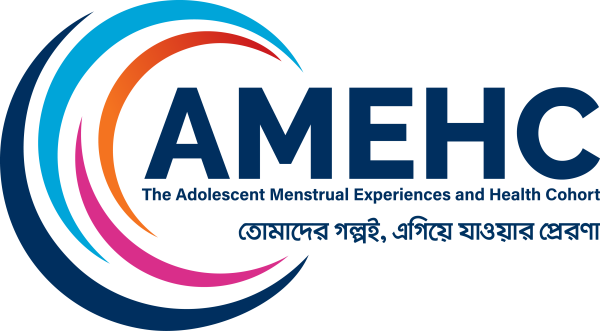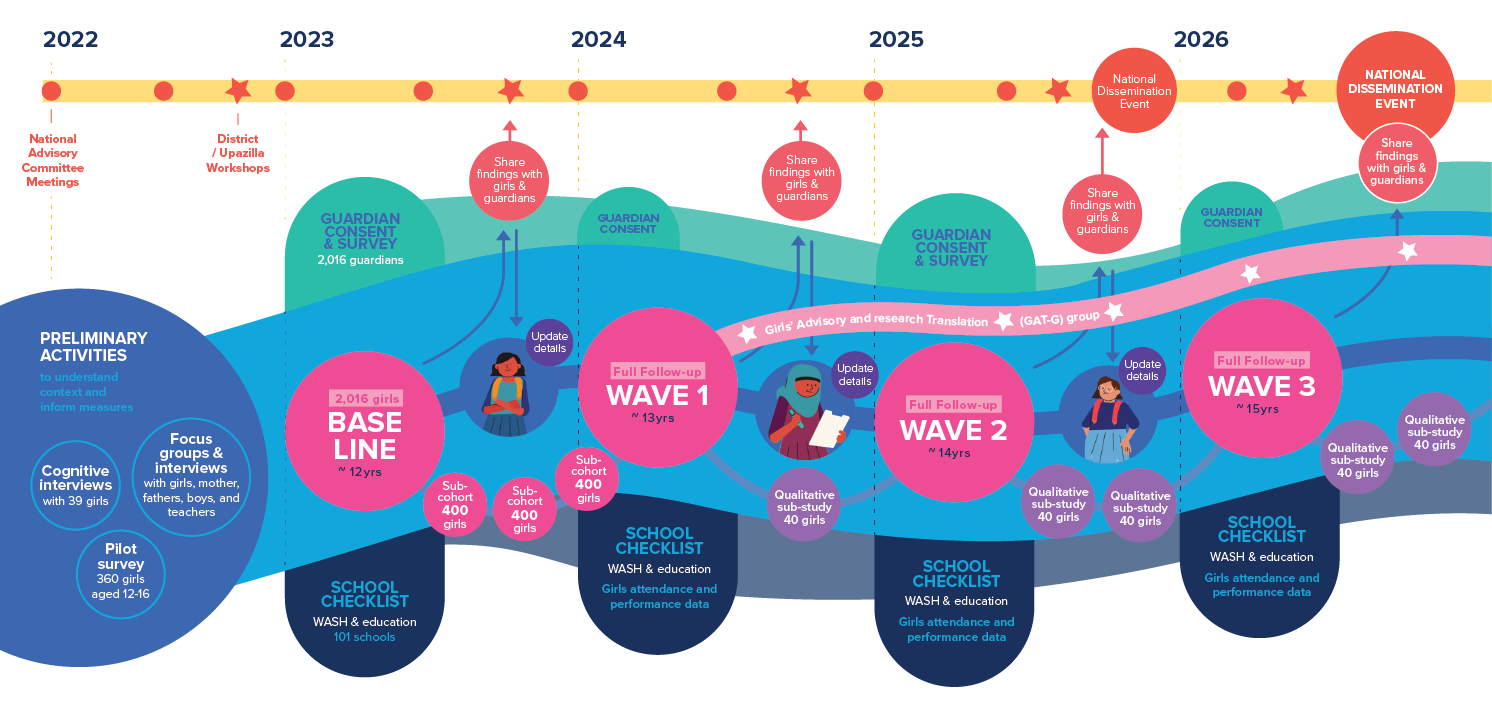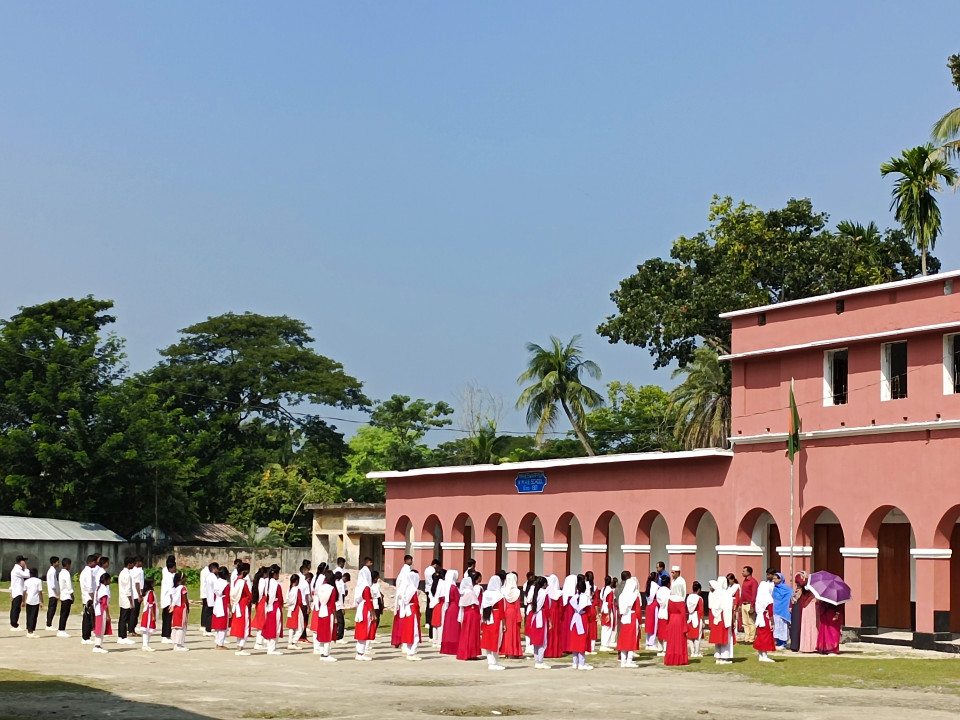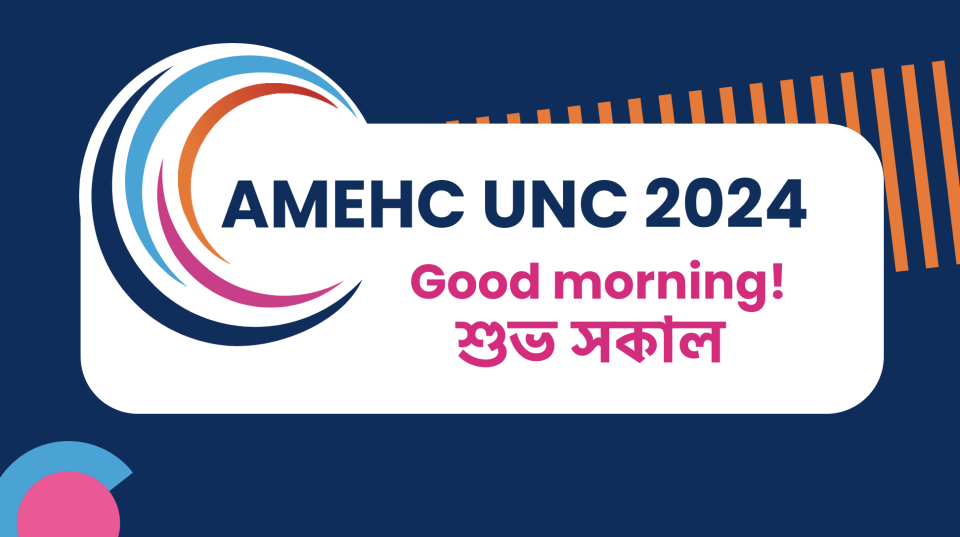
The Adolescent Menstrual Experiences and Health Cohort (AMEHC) study follows a cohort of adolescent girls over time to understand their changing menstrual experiences and the impacts this has on their lives.
The AMEHC study is a longitudinal research study following 2,000 girls in Khulna, Bangladesh from the start of their secondary schooling. Our baseline information and consent video provides brief explanation of the study methods!
An Overview
Click through the sections to the right to learn about the AMEHC study.
For more detailed information about the study methods and the hypotheses that we will test through the research, see the Protocol paper or Watch a presentation on the AMEHC study
-
Describe girls’ menstrual health needs and experiences, and how they change, throughout adolescence.
-
Quantify the impact of met and unmet menstrual health needs on girls’ education, mental health, physical health, and sexual and reproductive health over time.
-
Understand the pathways to menstrual health, including the role of contextual factors.
This study will build the evidence to understand adolescent menstrual health needs and their impacts over the life-course.
Providing an understanding of the way girls menstrual health needs change over time will help to target age-appropriate education and intervention.
While there is increasing recognition that menstruation is important, there are few reliable estimates of the extent to which menstrual health affects girls’ lives over the long term. Quantitative estimates of these effects will equip advocacy, support sustainable investment from governments and other donors, and help inform cost-effective interventions and intervention development.
A longitudinal cohort is best placed to rigorously estimate these effects. Menstruation is a frequent, repeated experience, and it is likely that the impact of unmet needs accumulates over time. A longitudinal study helps us capture the changes over time, and allows us to explore the relationships between early life events and later outcomes.
The AMEHC research programme launched in 2022. We undertook a year of preparatory activities to understand more about girls' needs in context through qualitative research and to develop, adapt and test appropriate survey measures.
The cohort launched in 2023, and enrolled 2,016 adolescent girls at the start of class 6 (secondary school) across a representative sample of schools in a rural and an urban region within Khulna District.
During our baseline data collection we surveyed girls' guardians (mostly parents), girls themselves, and undertook checklists to capture the available school facilities and support.
Annual surveys with girls, education data collected from schools, and school checklists now capture changing experiences and track the impact of menstrual health on girls' lives. Girls' guardians will be surveyed again in 2025.
Alongside the main cohort, embedded sub-studies help us understand specific additional research questions. Throughout 2023, we undertook an intensive 'sub-cohort' with 400 menstruating girls from the cohort. We surveyed them at 2-month intervals to understand the variability in experiences over shorter time spans.
From 2024, a qualitative 'sub-cohort' of approximately 40 girls selected from the cohort will provide additional perspectives on girls' lived experience and the way their relationship with their bodies and their menstruation changes over time.
Throughout the study, engagement with a National Advisory Committee, a Girls Advisory Group (selected from the cohort), workshops at the district and sub-district level, along with yearly dissemination to schools and participants will support the development of recommendations for how government and NGOs should respond to the findings.
Study Timeline

Findings

AMEHC Protocol
Protocol for the Adolescent Menstrual Experiences and Health Cohort (AMEHC) Study in Khulna, Bangladesh

AMEHC at UNC Water & Health Conference
On 25 October 2024 the AMEHC team from Bangladesh and Australia discussed early findings from our first year of data collection.
Our Partners




